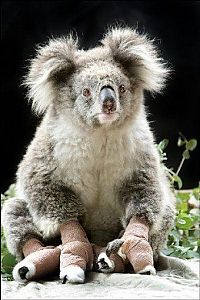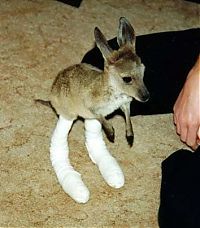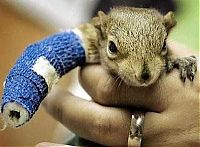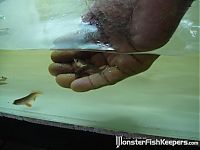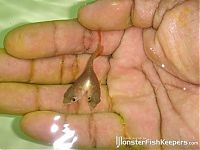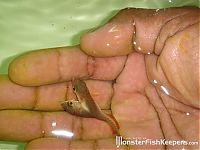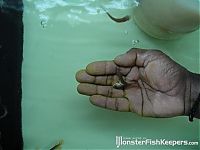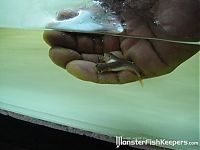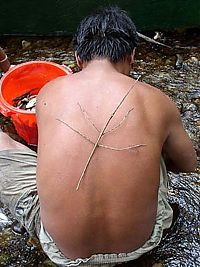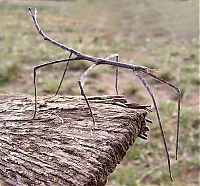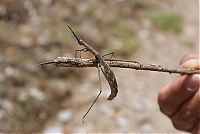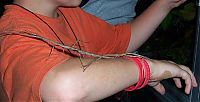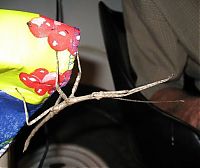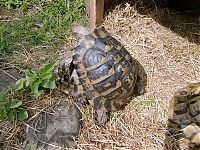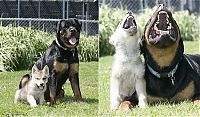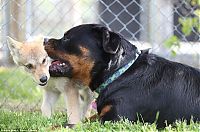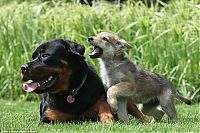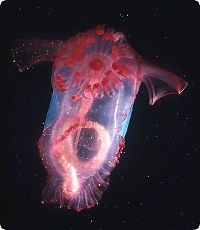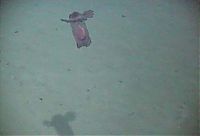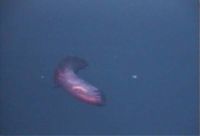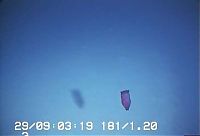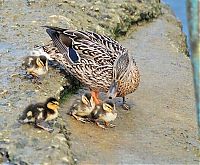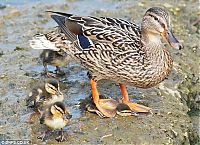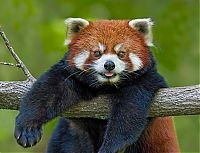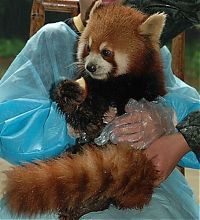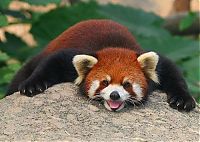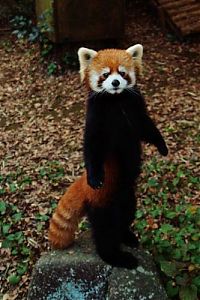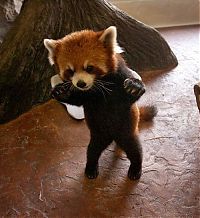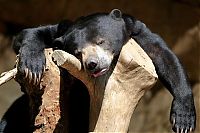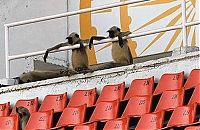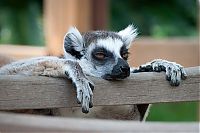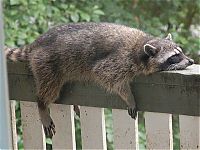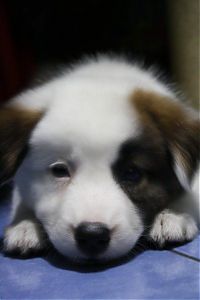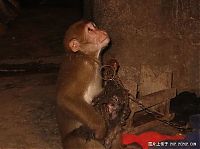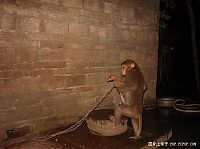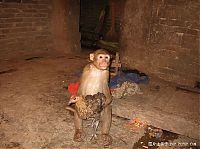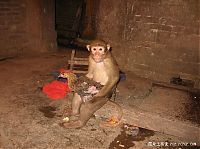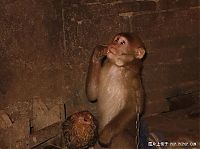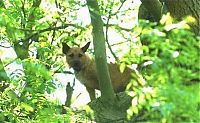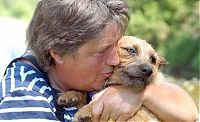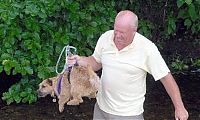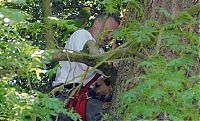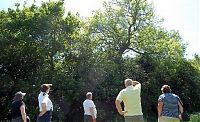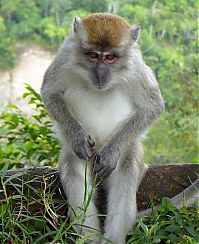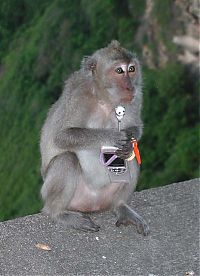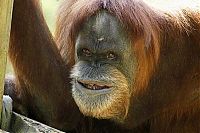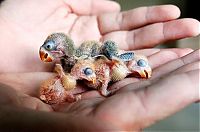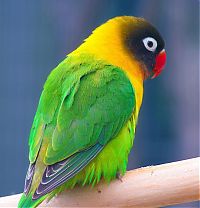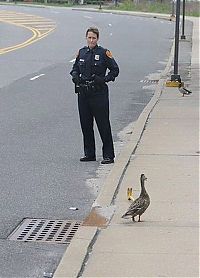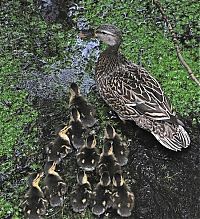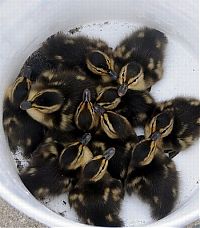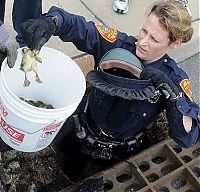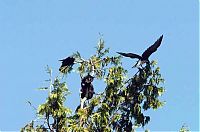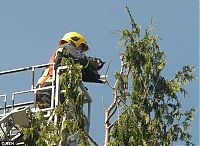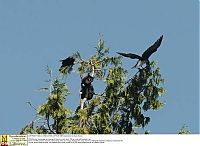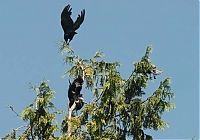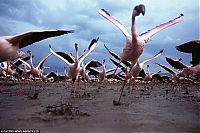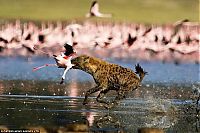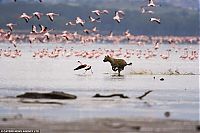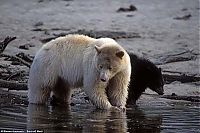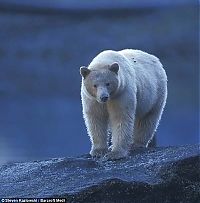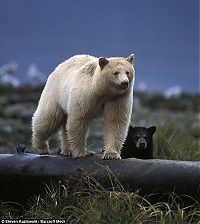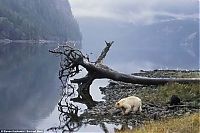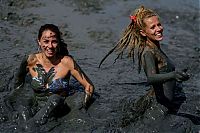Broken Animals
Wednesday, 24th June 2009, 10:07:33
Album: Fauna & Flora, New uploads: 7, Hits: 248, Size: 0MiB
Animals are a major group of multicellular, eukaryotic organisms of the kingdom Animalia or Metazoa. Their body plan eventually becomes fixed as they develop, although some undergo a process of metamorphosis later on in their life. Most animals are motile, meaning they can move spontaneously and independently. All animals are also heterotrophs, meaning they must ingest other organisms for sustenance...
Two Head Fish
Wednesday, 24th June 2009, 09:13:43
Album: Fauna & Flora, New uploads: 6, Hits: 145, Size: 0MiB
Fish are a paraphyletic group of organisms that consist of all gill-bearing aquatic vertebrate (or craniate) animals that lack limbs with digits. Included in this definition are the living hagfish, lampreys, and cartilaginous and bony fish, as well as various extinct related groups...
Twig Or?
Tuesday, 23rd June 2009, 11:31:27
Album: Fauna & Flora, New uploads: 10, Hits: 296, Size: 1MiB
...
Turtle
Tuesday, 23rd June 2009, 11:30:11
Album: Fauna & Flora, New uploads: 2, Hits: 43, Size: 0MiB
Turtles are reptiles of the order Testudines (the crown group of the superorder Chelonia), characterised by a special bony or cartilaginous shell developed from their ribs that acts as a shield. "Turtle" may either refer to the Testudines as a whole, or to particular Testudines which make up a form taxon that is not monophyletic.
The order Testudines includes both extant (living) and extinct species...
Dog Family
Friday, 19th June 2009, 12:32:21
Album: Fauna & Flora, New uploads: 3, Hits: 64, Size: 0MiB
The dog (Canis lupus familiaris and Canis lupus dingo) is a domesticated form of the gray wolf, a member of the Canidae family of the order Carnivora. The term is used for both feral and pet varieties. The domestic dog has been the most widely kept working, hunting and companion animal in human history. The word "dog" may also mean the male of a canine species, as opposed to the word "bitch" for the female of the species.
Dogs were domesticated from gray wolves at least twice...
Sea Cucumber (Holothuroidea)
Friday, 19th June 2009, 11:48:09
Album: Fauna & Flora, New uploads: 11, Hits: 309, Size: 0MiB
...
Cruel Duck
Thursday, 18th June 2009, 20:57:05
Album: Fauna & Flora, New uploads: 2, Hits: 53, Size: 0MiB
Duck is the common name for a number of species in the Anatidae family of birds. The ducks are divided between several subfamilies in the Anatidae family; they do not represent a monophyletic group but a form taxon, since swans and geese are not considered ducks. Ducks are mostly aquatic birds, mostly smaller than the swans and geese, and may be found in both fresh water and sea water...
Red Panda Or Firefox
Wednesday, 17th June 2009, 13:38:34
Album: Fauna & Flora, New uploads: 10, Hits: 276, Size: 1MiB
Fox is a common name for many species of omnivorous mammals belonging to the Canidae family. Foxes are small to medium-sized canids (slightly smaller than the medium-sized domestic dog), characterized by possessing a long narrow snout, and a bushy tail (or brush).
Members of about 37 species are referred to as foxes, of which only 12 species actually belong to the Vulpes genus of "true foxes...
Sleeping Animals
Wednesday, 17th June 2009, 13:37:06
Album: Fauna & Flora, New uploads: 7, Hits: 296, Size: 0MiB
Sleep is a naturally recurring state characterized by reduced or absent consciousness, relatively suspended sensory activity, and inactivity of nearly all voluntary muscles. It is distinguished from quiet wakefulness by a decreased ability to react to stimuli, and is more easily reversible than being in hibernation or a coma. Sleep is a heightened anabolic state, accentuating the growth and rejuvenation of the immune, nervous, skeletal and muscular systems...
Monkey And Chicken
Tuesday, 16th June 2009, 15:29:18
Album: Fauna & Flora, New uploads: 5, Hits: 120, Size: 0MiB
A monkey is any cercopithecoid (Old World monkey) or platyrrhine (New World monkey) primate. All primates that are not prosimians or apes are monkeys. The 264 known extant monkey species represent two of the three groupings of simian primates (the third group being the 22 species of apes). Monkeys are generally considered to be intelligent and, unlike apes, monkeys usually have tails...
Dog On A Tree
Tuesday, 16th June 2009, 11:55:13
Album: Fauna & Flora, New uploads: 6, Hits: 135, Size: 0MiB
A tree is a perennial woody plant. It is most often defined as a woody plant that has many secondary branches supported clear of the ground on a single main stem or trunk with clear apical dominance. A minimum height specification at maturity is cited by some authors, varying from 3 m to 6 m; some authors set a minimum of 10 cm trunk diameter (30 cm girth). Woody plants that do not meet these definitions by having multiple stems and/or small size are called shrubs...
Monkey
Thursday, 11th June 2009, 11:08:27
Album: Fauna & Flora, New uploads: 8, Hits: 192, Size: 0MiB
A monkey is any cercopithecoid (Old World monkey) or platyrrhine (New World monkey) primate. All primates that are not prosimians or apes are monkeys. The 264 known extant monkey species represent two of the three groupings of simian primates (the third group being the 22 species of apes). Monkeys are generally considered to be intelligent and, unlike apes, monkeys usually have tails...
Birdies, Jurong Bird Park, Singapore
Wednesday, 10th June 2009, 09:42:13
Album: Fauna & Flora, New uploads: 2, Hits: 66, Size: 0MiB
Birds (class Aves) are feathered, winged, bipedal, endothermic (warm-blooded), egg-laying, vertebrate animals. Around 10,000 living species makes them the most speciose class of tetrapod vertebrates. They inhabit ecosystems across the globe, from the Arctic to the Antarctic. Extant birds range in size from the 5 cm (2 in) Bee Hummingbird to the 2.75 m (9 ft) Ostrich...
Baby Ducklings Rescue
Tuesday, 9th June 2009, 10:49:58
Album: Fauna & Flora, New uploads: 8, Hits: 300, Size: 0MiB
Duck is the common name for a number of species in the Anatidae family of birds. The ducks are divided between several subfamilies in the Anatidae family; they do not represent a monophyletic group but a form taxon, since swans and geese are not considered ducks. Ducks are mostly aquatic birds, mostly smaller than the swans and geese, and may be found in both fresh water and sea water...
Cat Climber
Tuesday, 9th June 2009, 10:49:00
Album: Fauna & Flora, New uploads: 5, Hits: 160, Size: 0MiB
The cat (Felis catus), also known as the domestic cat or housecat to distinguish it from other felines and felids, is a small furry domesticated carnivorous mammal that is valued by humans for its companionship and for its ability to hunt vermin and household pests. Cats have been associated with humans for at least 9,500 years, and are currently the most popular pet in the world. Owing to their close association with humans, cats are now found almost everywhere on Earth...
Attack On Birds
Tuesday, 9th June 2009, 10:46:21
Album: Fauna & Flora, New uploads: 3, Hits: 73, Size: 0MiB
Birds (class Aves) are feathered, winged, bipedal, endothermic (warm-blooded), egg-laying, vertebrate animals. Around 10,000 living species makes them the most speciose class of tetrapod vertebrates. They inhabit ecosystems across the globe, from the Arctic to the Antarctic. Extant birds range in size from the 5 cm (2 in) Bee Hummingbird to the 2.75 m (9 ft) Ostrich...
Family White And Black Bears, British Columbia, Western Canada Province
Tuesday, 9th June 2009, 10:41:55
Album: Fauna & Flora, New uploads: 4, Hits: 138, Size: 0MiB
In human context, a family (from Latin: familiare) is a group of people affiliated by consanguinity, affinity, or co-residence. In most societies it is the principal institution for the socialization of children. Extended from the human "family unit" by affinity, economy, culture, tradition, honor, and friendship are concepts of family that are metaphorical, or that grow increasingly inclusive extending to nationhood and humanism...
| History | 1 | - | 7 | 8 | 9 | 10 |
|
|
||||||||||||||

